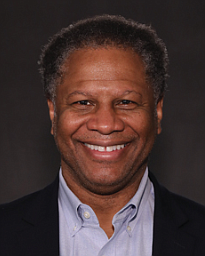Addressing lung cancer health disparities, by Dr. Robert A. Winn
5/11/2023, 6 p.m.
The cancer field has made incredible progress in “molecules to medicine” – finding new ways to target and treat cancer and developing innovative treatments such as immunotherapies. But these advances alone are not going to solve persistent disparities in lung cancer, which disproportionately impact Black Americans.
Black men are about 12% more likely to develop lung cancer than white men. And Black Americans with lung cancer are 15% less likely to be diagnosed early, 19% less likely to receive surgical treatment, 10% more likely to not receive any treatment, and 12% less likely to survive five years compared to white Americans.
We need 21st century approaches to address these disparities; the solutions lie in three areas.
First, we need data and research that uncover why Black lung cancer patients have worse outcomes. While most cases of lung cancer are not related to inherited genetic changes, genetics and ancestry play a role in how well cancer patients respond to treatment. Collecting and analyzing this type of data needs to be prioritized as we seek to develop effective treatments that improve outcomes for Black lung cancer patients.
Second, genetic information needs to be woven together with social drivers of health, which are the conditions in which people are born, grow, work, live and age. I prefer “social drivers of health” versus the commonly used phrase “social determinants of health,” which infers unalterable destiny, as many of these variables can be addressed. We cannot look at biology and DNA without also considering an individual’s environment and zip code and neighborhood of association, what I call ZNA. High stress equals poorer health outcomes and more cancer. Dr. Lisa Newman at New York-Presbyterian/ Weill Cornell Medical Center pioneered sophisticated analysis of how space and place impact DNA in Black women disproportionately dying of breast cancer. It’s time to apply this approach to address lung cancer in Black Americans.
Third, we need to look beyond urban and suburban settings to rural settings and even further to frontier communities. With as few as six people per square mile, Black residents in these “data deserts,” are often overlooked. Many new cancer treatments are oral drugs, which means they can be sent to patient homes regardless of where they live. New genetic-based early detection platforms are increasing screening opportunities for rural patients and reducing the need to travel for this type of care. The more transportable screening and treatment becomes, the better we can design new models of “virtual” cancer care to support rural and frontier communities.
Black Americans located in rural parts of Virginia, North Carolina and South Carolina are the foundation for a new collaboration between Virginia Commonwealth University Massey Cancer Center, Medical University of South Carolina Hollings Cancer Center, and University of North Carolina Lineberger Comprehensive Cancer Center. Through our unique Stand Up To Cancer Lung Cancer Health Equity Research Team, we are bringing together translational cancer research and social sciences to both innovate patient engagement strategies as well as collect DNA samples from Black men with lung cancer to address why they are disproportionately impacted by this disease. It’s this type of funding and collaboration that’s critical to addressing all cancer disparities.
Inequities in lung cancer need to be addressed at all levels of the public health continuum. We need to test, refine and implement new 21st century approaches and ensure we’re harnessing all of the research and technology available to us. People impacted by lung cancer – especially our communities that are disproportionately affected – deserve no less.
The writer is director and Lipman Chair in Oncology, Virginia Commonwealth University Massey Cancer Center Leader, SU2C Lung Cancer Health Equity Research Team: Southeastern Consortium for Lung Cancer Health Equity.








